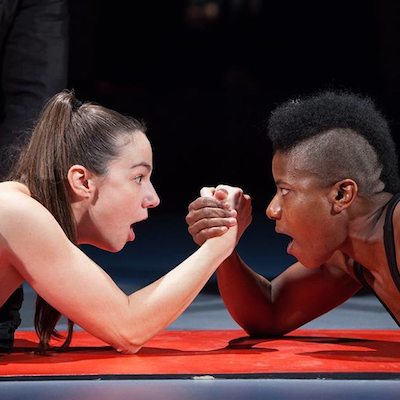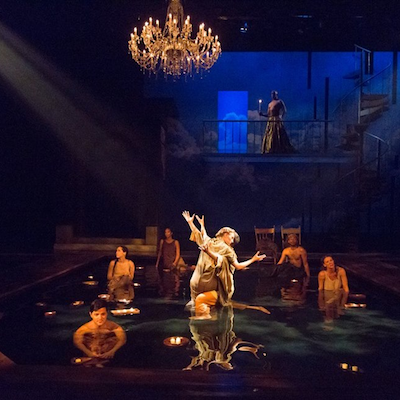Philly Theaters Take On Classic Mythology in Radically Different Ways

Left: Arden Theater’s production of “Metamorphoses.” Right: Wilma Theater’s production of “Antigone.”
They’re the tales you learned in freshman year of high school: Of Aphrodite and Antigone, of gods and goddesses too numerous to actually remember (I recall being given a flow chart to fully understand the lineage line in several tales). The stories are old, passed on via numerous translations and oral tradition.
So it is interesting, if not slightly odd, that two of Philadelphia’s major theater companies open their seasons with these tales: the Wilma’s Antigone and Arden’s Metamorphoses. Yet the approaches that both productions take are so varied, so completely different, that it is important to remember that the core foundation of mythology, of Greek drama, is that storytelling is a human necessity.

A scene from “Antigone.”
I’ll start with Antigone, which is, by far, one of the strangest productions I’ve ever seen in my life. Some might argue that director Theodoros Terzopoulos’s staging is too strange, that it is absurd with no solid rationale. That’s not to say that the cast wasn’t outstanding, demonstrating a sense of physical dexterity that was breathtaking. Of note, the chorus was, quite literally, syncopated down to the breath, and Jennifer Kidwell, who took on the title character, gave a spectacular performance.
But what happens when the audience is lost in a play’s staging? In other words, what happens when storytelling is secondary? That’s the problem in this Antigone, which relies on Terzopoulos’ hyper physical style that was extremely heavy-handed. No doubt, Antigone is a protest play, a play about the lack of justice in society. Yet, I couldn’t help but cringe when this Antigone began to sing Gershwin’s “Summertime” from Porgy and Bess as her character awaited her death, not because Ms. Kidwell didn’t have a lovely voice, but because the seemingly overt racial commentary didn’t feel natural and organic in a time when racial injustice in America is under such an important microscope.
Across town is yet another piece that examines classic Greek tales, and, yes, it uses a series of metaphors and allusions in its staging. But unlike Antigone, the Arden’s Metamorphoses never loses sight of why myth was created to begin with. When I reviewed the show several weeks ago, I was impressed by the imagery used throughout the production, and how some of the more subtle moments where characters used paper cut-outs or small toy boats were most effective.

A scene from “Metamorphoses.”
Yes, there’s the huge pool involved in the Mary Zimmermann play, which is, at the core, a series of vignettes that recall mythological tales. But behind the massive tub of water, which some may suggest is a touch kitschy (I don’t think it is), the staging never forgets the core element of storytelling. Underneath all the splashing, swimming, and underwater choreography, you’re able to clearly see the action build toward a greater understanding of the tale. That’s what makes the show so effective and impactful: It’s just good theater that relies on basic human story to engage an audience.
There’s also the question of catharsis, or the physical purging of emotions. That was, in essence, why the Ancient Greeks wrote dramas: for an audience to undergo a type of release. Sure, those who take part in Philly’s current unintentional mini Greek theater festival will undergo an emotional transformation. Alas, it’s up to the audience to make the determination which stories will last with them, and how.


